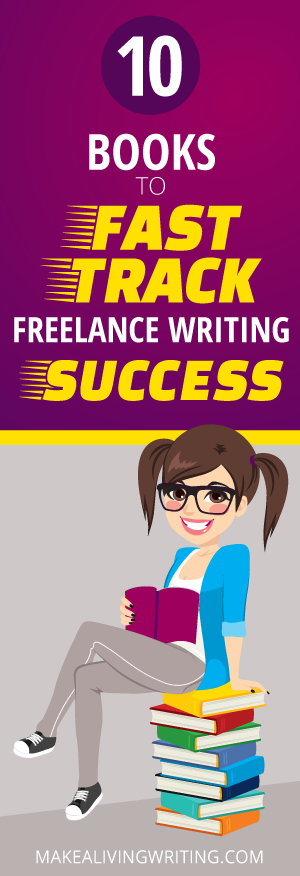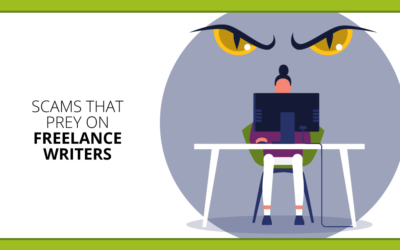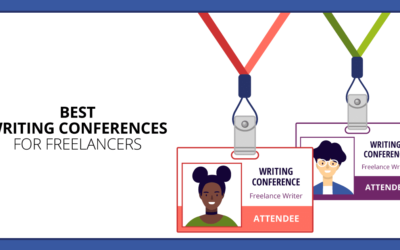What happens when freelance writers want to build their careers? Well, since we’re ‘word’ people, we tend to ask our friends, “What good books for writers should I read?”
Lengthy chats erupt on Facebook in response, about the most inspiring and useful books on writing craft. Books such as Writing Down the Bones by Natalie Goldberg, Bird by Bird by Anne Lamott, and Stephen King’s On Writing are enthusiastically discussed and endorsed.
I’ve read and loved these books, too. But I don’t think they’re the ideal books for writers, especially if your focus is making a reliable living at your craft.
My experience is writers read these books, think, “Aaah, wonderful! Terrific insights.” Then, they go straight back to starving.
Also, most writers I know don’t need to improve their craft. They write just fine.
The books for writers that will make a bigger impact are the ones about how to make a business from writing. How to freelance successfully. How to finally find the confidence to put your writing out there.
Those are the books for writers that can really change your life. The books that show you how to feed your family, on a regular basis, with your craft.
If that’s the sort of help you need, here’s a list of practical books on the business of being a writer that I frequently recommend.
My top 10 best books for writers
They’re listed in alphabetical order (and yes, these certainly contain affiliate links):
1. Breaking the Time Barrier
Nearly every week, I find myself coaching a writer and recommending they grab a copy of this free e-book by Michael McDerment and Donald Cowper. McDerment is a co-founder of Freshbooks, and teamed with content writer Cowper on this story-based tale of how to change your mentality from clerk to expert — and charge way more.
If you’re still charging by the hour or by the word for your writing services, get this book now. It explains how to make the quantum leap to charging premium rates.
2. My So-Called Freelance Life
I’m embarrassed that it took a reminder from a writer friend on my Facebook page that my awesome Seattle gal-pal Michelle Goodman’s book on “How to survive and thrive as a professional creative for hire” deserves a mention here.
Michelle is awesome and a tireless advocate for helping writers grow their careers. She boils down her advice in this book — check it out.
3. Premium
This is the book on my phone right now. It’s subtitled, “How experts like you are charging premium rates for what they know and you can too!” If you think freelance writers aren’t ‘experts’ and this info wouldn’t apply to you, this tome will change your mind.
Rob Cuesta’s book is stuffed with detailed examples of exactly how various consultants and coaches exploded their rates, and marketed themselves differently. If you need to find better clients, and more of them, give this a read. Think of this one as a more in-depth version of Breaking the Time Barrier.
4. Six Figure Freelancing
This second edition of Kelly James-Enger’s “Writer’s guide to making more money” has stood the test of time.
I’ve had the pleasure of having Kelly as a guest on Freelance Writers Den podcasts more than once, and she is the whip-smart real deal. I meet a lot of writers who say, “But I don’t really need to earn six figures…” Yeah. You still need to read this, so you can get into the mentality that you deserve to be well-paid.
5. Start & Run a Copywriting Business
Steve Slaunwhite is the most effective trainer I’ve ever had in the Den, bar none. He has a true gift for imparting information so you really ‘get’ it.
So a book from him on copywriting? Yes. Read it. (Thanks to reader Carole Cudnik for the memory jog on this one.)
6. The Step by Step Guide to Freelance Writing Success
Yes, shameless plug — I did co-author this e-book with wonderful Laura Spencer of Writing Thoughts. If you can’t seem to get off the starting blocks, or are trapped in a cycle of writing for pennies on UpWork, a content mill, or with Craigslist clients, this one is for you.
Along with Breaking the Time Barrier, this is the book I send writers to the most. If you’re wandering in the wilderness, unable to figure out your best opportunities, this book will show you how to quickly create a portfolio that impresses prospects (based on your own interests and experience) and start getting well-paid gigs. Comes complete with scripts of exactly what to say when you pitch those first pro-bono clients to get those first great samples.
7. This Business of Books
Are you sitting home, dreaming of landing a book deal with a traditional publisher? You need this book. Subtitled “A complete overview of the industry from concept through sales,” this book will end your magical thinking and tell you exactly how bestsellers are created.
I recently had a chance to host its author, ghostwriting expert Claudia Suzanne, for a Freelance Writers Den bootcamp. I learned a ton, right along with the rest of the Denizens, even though I’ve already done a couple book-ghosting gigs.
8. The War of Art
Are you still spouting excuses about why you can’t write today?
Steven Pressfield’s classic on creative productivity will help you end the procrastination, and show you how to get your butt in the chair regularly to crank out the writing.
9. The Well-Fed Writer
Peter Bowerman’s classic tome of launching a copywriting business is another book that has really stood the test of time. If you’re ready to stop talking about earning a living as a writer and get that sucker off the ground, read this.
This book is about time-tested methods of quickly getting your copywriting business launched. Peter’s system is hard work and not a magic wand, but he lays out proven ways of getting there.
10. The Wealthy Freelancer
I recently moved and gave away most of my books — but this book made the trip.
We’re talking Pete Savage, Ed Gandia, and Steve Slaunwhite here, teamed up to share their ’12 Secrets to a great income and an enviable lifestyle.’ Recommended for struggling freelancers of all stripes.
Remember — read, do, read
I’ve mentioned a lot of books for writers here — so just a warning not to get caught in the perpetual learning trap.
Don’t forget to read a bit, implement the ideas you learn, and then read some more. All reading and no doing means you continue to make no progress toward your freelance goals.
What books have helped you earn more as a writer? Feel free to add to my list in the comments.










